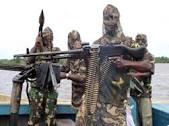
Boko Haram has been driven out of most of its bases in northern Nigeria but in the past year, it has moved across the border to Chad. The BBC’s Thomas Fessy met one family who have been devastated by the Islamist militant group.
Djibrilla, 64, sits quietly in the corner of the hut. Gusts of dusty wind blow through the walls of reeds. Months have passed without a sign of life from five of his eight children.
Aged between 2 and 15, they were abducted by Boko Haram militants last year.
Where are they? How are they doing? Are they being forced to fight? So many questions he cannot answer.
“I can’t understand even though I am trying to make sense of it,” he says.
“I am so shocked, they are too young to defend themselves. I have to give it up to God, there’s nothing I can do.”
The five children were seized during an attack on their village. Those who survived the deadly raid, like Djibrilla, are now living in a makeshift camp.
Many of these camps have sprung up between the sandy tracks and dunes that surround Lake Chad, which forms the border between Nigeria and Chad.
People who lived on the lake islands were forced to settle in the desert, away from their fishing grounds and farmlands.
Boko Haram fighters attacked their homes or they were told to move out by Chadian soldiers who fear jihadis may infiltrate them.
Chad, Nigeria, Cameroon and Niger have formed a regional force to tackle the militants, which has staged attacks on all four countries.
Djibrilla’s community is obviously not receiving much assistance.
In this desolation, “a day of joy,” as he describes it, eventually happened last September.
Trucks from the Chadian army stopped by the camp. Soldiers were bringing his eldest son, Youssouf (not his real name), back to him.
Youssouf, 26, had left home before his brothers and sisters were seized. He had gone to join the militant group of his own free will.
But he wasn’t the only one.
“Men came to our village and told us we should join Boko Haram,” says Adam (not his real name).
He is 16 and he spent two months last year with the group.
He is sitting on his left leg, holding his toes while he speaks. As he looks down, his face shows some kind of embarrassment.
Next to him, Youssouf says: “There was nothing to do at home and we were told we would get lots of money.”
“We would get everything we wanted.”
Most young people in the region have not had any education, except at Koranic school.
On top of the state neglect, a devastating environmental shift has caused Lake Chad to shrink to a small portion of its original size, pushing families who depend on it further into poverty.
The lack of infrastructure, education and prospects has pushed many into the hands of Boko Haram, lured by the promised gold.
“The drying of the lake is creating socio-economic problems among young people,” the regional traditional chief, Youssouf Mbodou Mbami says.
“They have no activity and Boko Haram is telling them that they have money. So they go join their ranks.”
“It has had a very serious impact on them.”
Returning from a visit to the region, the UN Regional Humanitarian Coordinator for the Sahel, Toby Lanzer, points the finger of blame in the same direction.
“The extreme violence is the most visible driver of instability and need for emergency relief,” Mr Lanzer says.
“But the root of the crisis lies in the abject poverty and environmental degradation which has been plaguing the region for decades.”
“It is one of the hardest situations I have seen anywhere,” he says.
“The scale of the needs is simply immense.”
Back at the dusty camp, Adam and Youssouf describe fighters from Chad who recruited them, proof that the Nigerian insurgency has taken on a regional dimension.
“We were split into groups,” Youssouf explains.
“Those who had been there longest were trained with weapons and they would gather to recite the Koran; but we were kept apart.”
END

Be the first to comment